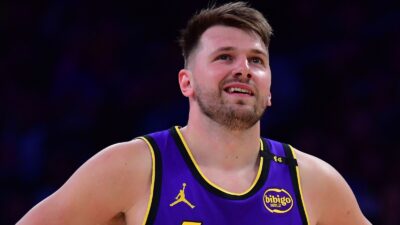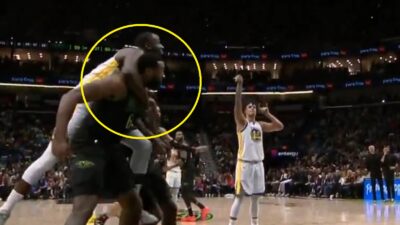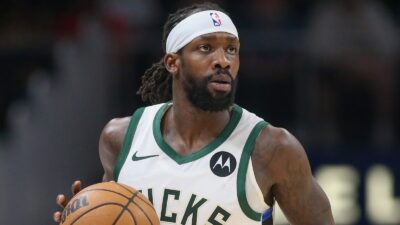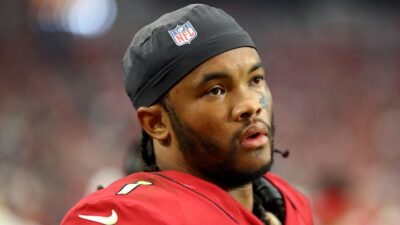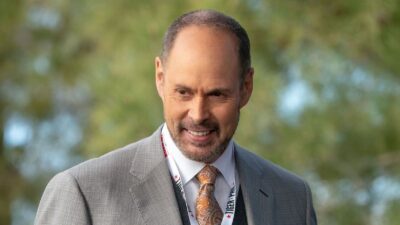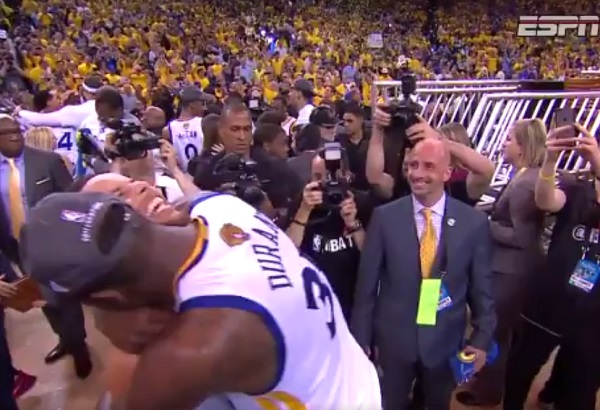
The Golden State Warriors have done it again. Golden State captured its second NBA championship in the past three years and avenged last year’s loss to the Cavaliers, taking Game 5 of the series 129-120 on Monday night at Oracle Arena.
Kevin Durant was superb, scoring 39 points on 70 percent shooting from the field. Steph Curry had 34 points and 10 assists, while Andre Iguodala contributed 20 points off the bench. The Warriors also won the series in five, meaning they came one game away from rattling off a perfect postseason run.
So what did the Warriors do to win it all? Let’s take a look at the biggest reasons why they won the championship this year.
1. Kevin Durant made them almost unfairly good
When you have a team that goes 73-9 in a season and comes a win away from capturing the championship, and then you add an MVP in his prime to the roster, you’re just going to be better. And even though the Warriors weren’t quite as strong in the regular season as they went 67-15 this season, there is no question that they were a better team this year.
Kevin Durant gave the Warriors more versatility, more scoring, more firepower, made them more difficult to guard, and he made them a much better team all around. Last year’s squad lost at least a game in each playoff series before blowing a 3-1 lead to the Cavs in the NBA Finals. This year’s team went 15-0 in the playoffs before losing. Even the championship team from two years ago dropped games in the conference semis and conference finals, but this team didn’t.
Durant led the Warriors with a 27.7 PER, scored 25.1 points per game — second to Steph Curry, and he was the team’s leading rebounder during the regular season. Some skeptics thought that Durant’s presence would lead to an adjustment period for some of Golden State’s other stars, as well as potential resentment over fewer shots, but that did not happen. Klay Thompson’s scoring and attempts remained essentially the same as last year, and Curry only ended up with two fewer shots per game. The player who probably gave up the most was Draymond Green, who took 1.5 fewer shots and played fewer minutes per game than last season. But Green is such a team player and so capable of performing on both ends that Durant’s presence didn’t impact him negatively.
Durant was not afraid to step up in big moments and assumed a lead role with confidence. That was evident with his game-changing 3-pointer in Game 3 of the NBA Finals.
Kevin Durant is cold blooded. What a clutch shot. pic.twitter.com/zFwVzl0rJV
— Legion Hoops (@LegionHoops) June 8, 2017
Durant made an already great team almost unfairly good. He was awesome in the postseason, and truly stepped up in the NBA Finals by scoring at least 31 points in every game, capping off the series with a game-high 39 in Game 5. He became the first player since Shaq in 2000 to score at least 30 points in five straight Finals games.
2. Golden State had the revenge factor
As much as these athletes are professionals who are motivated and driven, the reality is some sort of complacency sets in after winning a championship. That’s the truth, and that’s why it’s so hard for teams to repeat as champs in any sport.
It’s hard to argue that the Warriors weren’t motivated after winning their championship two years ago; they went 73-9 in the regular season last year and looked even better than the year before. But once they got up 3-1 in the NBA Finals, did they let up even the slightest because they thought they had it? Did something change where the Cavs wanted it a little more? That’s possible.
However, it’s clear this season Golden State was on a mission. They were determined to win from the start, they hit the postseason playing at their peak, and they took care of business as quickly as possible in each playoff series.
Plus, if they hadn’t lost last year to the Cavs, maybe they wouldn’t have been as desperate to get better, which led them to recruiting Kevin Durant with extreme vigor. Losing in the Finals last year may have been the best thing to happen to the Warriors because of what it led them to do and achieve. It also may have set them up to become a dynasty that runs off multiple championships in a row.
3. They were smarter in this postseason
Golden State avoided the pitfalls that plagued them in last year’s NBA Finals — and playoffs in general.
Draymond Green accumulated four flagrant fouls during the playoffs last year, mostly because he couldn’t stop punching opponents in the groin. He ended up suspended for Game 5 of the NBA Finals, which Cleveland won, giving the Cavs the momentum needed to begin their historic comeback.
This time around, Green kept his emotions in check, which can partially be attributed to Mike Brown. One of Brown’s biggest roles with the Warriors is to keep Green in check. Green really only had one issue in the playoffs, and it came in Game 4 when he was called for a tech. It appeared he would be ejected from the game, but the NBA officials said a first tech was attributed to Steve Kerr and not Draymond.
Green wasn’t the only Warrior to lose his composure in the playoffs last year. Steph Curry did during Game 6 when he was ejected from a game for the first time in his career. He was fed up about what he felt were numerous questionable foul calls and ended up chucking his mouthpiece in frustration.
That frustration may have spilled into Game 7 for Curry, as the typically sharp shooter went just 6-for-19 and 4-for-14 on threes, scoring just 17 points.
In this year’s playoffs, the Warriors’ controversies really were limited to what happened with Zaza Pachulia. Pachulia made a questionable play against Kawhi Leonard that knocked the Spurs star out for their playoff series. Then in the NBA Finals, Pachulia had a groin punch on Iman Shumpert in Game 4 that was reviewed by the league. Outside of that, the Warriors mostly avoided the same major issues they had last year. Their key players kept their composure this year.
4. The “Death Lineup” was deadly
The Warriors are the model of the evolving NBA. They have multiple versatile players who can guard numerous positions on defense, be flexible on offense, and who can run the floor like nobody’s business. Their “Death Lineup” is the model of that.
This incarnation of the “Death Lineup” includes two NBA MVPs in Steph Curry and Kevin Durant, two All-Stars/All-NBA players in Klay Thompson and Draymond Green, and a former NBA Finals MVP in Andre Iguodala.
Steve Kerr did not use the lineup much, but he did in short spurts, and the dividends were enormous.
Warriors' Death Lineup has had a positive +/- in every stretch it's played in The Finals. +23 in less than 17 total minutes. pic.twitter.com/AMZ3n6XedN
— John Schuhmann (@johnschuhmann) June 12, 2017
The real impact of this lineup was felt at the end of Game 3. The Cavs were looking like they had that game and were on their way to making it a 2-1 series, but the Death Lineup blew them away and stole away Game 3 to make it a 3-0 series. That was a huge difference in the NBA Finals and tipped the series in Golden State’s favor.
5. The Cavs didn’t have enough after LeBron James
LeBron James was brilliant in the NBA playoffs this season. Truly brilliant. He averaged nearly a triple-double in the first round against the Pacers (32.8/9.8/9.0 per game); 36 points per game in the second round against the Raptors; shot 58 percent from the field against the Celtics; and LeBron averaged a triple-double in the Finals against the Warriors.
I’m not really sure what more LeBron could have done in the series, yet his team still lost in five games. And nothing magnifies how much he kept his team in competition more than the Cavs’ than Cleveland’s stats with James on and off the court. This chart was through the first four games of the series:
The #Cavs are +6 in the series when LeBron's on the floor and -31 when he sits https://t.co/F5FV2pxJ3i pic.twitter.com/rfhp6fbFyF
— Basketball Reference (@bball_ref) June 13, 2017
The Cavs were in a bad spot because if they rested LeBron, things would go south. But if they didn’t rest him, he wouldn’t be at his best or freshest for the end of the game. It was a catch-22.
Kyrie Irving’s numbers looked nice overall, but he shot 34.8 percent in a Game 2 loss and went 0-for-7 on threes in Game 3. Kevin Love did not hit his shots in Games 1, 3 and 5 of the series. Tristan Thompson went scoreless in two of the series’ first three games and was a non-factor, mostly because his style of play didn’t fit in with the pace of the games. Kyle Korver went 3-for-12 on threes in his first three Finals games, picking a horrible time to not be at his best. JR Smith was similarly ineffective the first two games of the series before getting hot after that and exploding in Game 5. Midseason acquisition Deron Williams was absolutely brutal, as he was 0-for-11 in his first three games of the Finals. About the only reliable bench player in the series was Richard Jefferson, who not only made his shots, but also played well on defense.
The Cavs’ supporting cast was good enough to beat the Warriors last year, but not this year’s incarnation of Golden State, which included Durant. As James said after one of the Cavs’ NBA Finals games, you have to play A++ ball in order to beat the Warriors. James brought that level of play in each game, but many of his teammates played C or D ball, and some even would get an F. You just can’t beat the Warriors playing like that.
The Cavs maybe can get a few more years of this incredible level of play from LeBron James before he starts to slow down. They need to make some roster changes in the offseason if they want to have a better shot at overtaking the Warriors next year.

